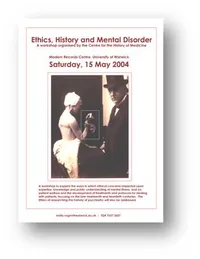Ethics, History and Mental Disorder
Specialist workshop
15 May 2004
Organiser: Hilary Marland
While historians of psychiatry have engaged extensively in studies of doctor-patient relationships, professional formation, the patients’ view, and the role of gender, class and race in shaping attitudes and treatment to mental illness, ‘ethics’ has been somewhat left aside as a framework of analysis. This workshop explored the ways in which ethical issues have impacted upon expertise, knowledge and public understanding of mental illness and on protocols for dealing with patients, focusing on the late nineteenth and twentieth centuries. Emphasis was likewise placed on how ethical issues shape our roles as historians of psychiatry and mental disorder, and how we approach sensitive material relating to individual patients and practitioners - an issue of particular importance in today's climate in which historians are required to adhere to codes of practice shaped by Data Protection legislation.
The workshop was attended by an invited group of twenty-two specialists; ten papers were presented in what amounted to a full and stimulating day.
Programme
Morning Session
David Wright (McMaster University)
The Ethical Historian
Trevor Turner (Homerton University Hospital)
Dogma or Stigma? Why are Psychiatrists so Bad at Trying to be Good?
Bill Fulford (Philosophy, University of Warwick; Honorary Consultant Psychiatrist, University of Oxford)
Philosophy and Psychiatry in the 20th Century: Four Looks Back and a Brief Look Forward
Len Smith (Centre for the History of Medicine, Birmingham)
Running to Stand Still? Managing Insanity in the Late Eighteenth and the Late Twentieth Centuries
Vicky Long (Warwick)
Working for Mental Health or for Oneself? The Ethics of Professionalisation for Mental Health Care Workers
Afternoon Session
Cath Quinn (Exeter)
Re-negotiating the Historian-Respondent Relationship
Jonathan Toms (Wellcome Trust Centre for the History of Medicine, UCL)
History, Mental Disorder and the Moral Order
John Stewart (Oxford Brookes)
Child Guidance in Inter-War Britain: Building 'integrated personalities capable of taking their place as members of the family of the Church and of the State'
Pamela Dale (Exeter)
From Mental Deficiency Work to Anti-Social Behaviour Order
Peter Bartlett (University of Nottingham)
Medicalising Murder: Psychiatric Evidence and Homicides of Gay Men, 1976-2000
Mona Gupta (McMaster University)
Commentary

